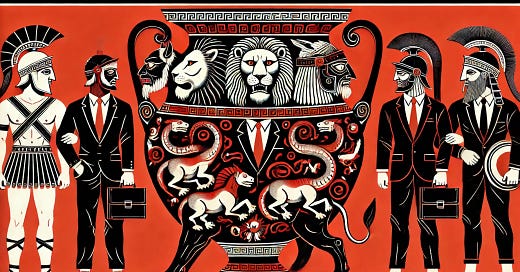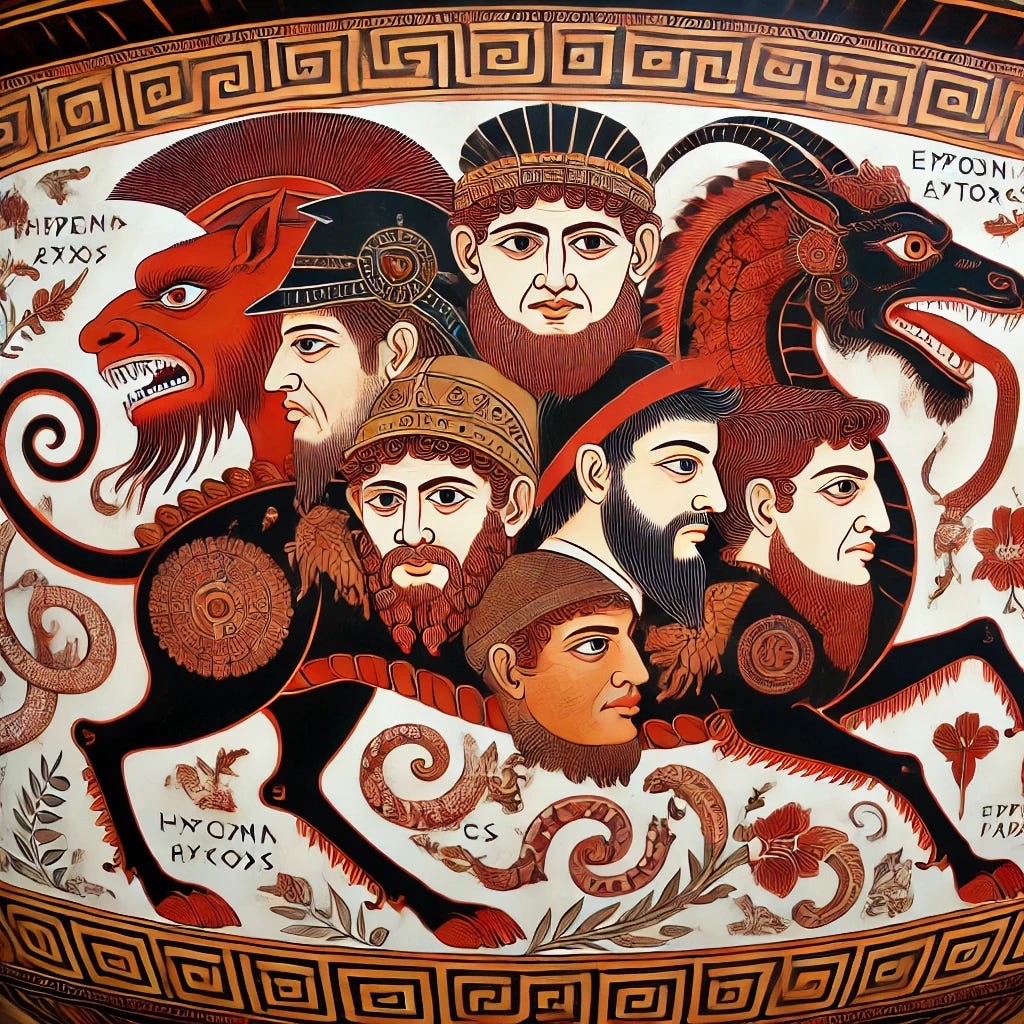Hello,
This is my submission to the Soaring Twenties Social Club (STSC) Symposium. July’s theme is “Chimera”. A chimera is an ancient Greek mythological monster: a lion with a goat’s head and a snake's tail. In a more general sense, a chimera is an implausible, unnatural creature composed of other animals’ parts. In an even more general sense, a chimera is an artificial abomination.
Of course, this letter is about modern Russia.
In a recent letter, I wrote about my interest for something called “z-poetry”. Elsewhere, I also mentioned my fascination with literary hoaxes. And lo and behold, the universe smiles, bringing me an epic story of the two coming together. To truly savor it, though, you have to know a bit of the context, so bear with me for a paragraph or two.
The Why of Z
The letter “Z” has become one of the symbols of the ongoing war in Ukraine, one of the symbols of the Russian invasion. The Russians chose it all by themselves, by the way. They deliberately put a letter that looks like half a swastika on their flags. They deliberately made schoolchildren stand in a Z-formation in schoolyards (will open a google-search of a bunch of these pictures; quite unpleasant, so caveat googler). There are some versions of why exactly it happened—after all, the letter “Z” is not even in the Russian alphabet—but it did.
So now, whenever somebody puts a “z-” prefix to a word, it immediately becomes ugly and means a very specific thing. Namely, moral support for the Russian atrocities in Ukraine. That brings us to “z-poetry”.
War of the Poets
“Z-poetry”, as one could now guess from the name, is a type of poetry that celebrates the war in Ukraine, specifically from the Russian side. In general, you can understand how important poetry is to the Russian and Ukrainian cultures from this simple fact: one of the first things that bloomed immediately after the conflict started was poetry.
The Ukrainian—and humanitarian—side has a lot of truly remarcable poets. There are poems lamenting death and war. Poems grieving for the life lost. Poems praising those who protect their home. Poems describing terrifying and conflicting realities of yesterday, today, and tomorrow for millions of people. Many of them are, no joke, among the best things written in the 21st century. They will be studied and appreciated together with the classics. In 50 years, there will be monographs written about this time in literature. Evgenia Berkovich, for example, a theater director and playwright who was sentenced last week to six years in prison for one of her plays, is an incredible poet.
And then there is the other side of the coin. “Z-poetry”—how can I describe it? To me, this is an interesting illustration of how a lack of morality can corrupt any talent. Of how it is literally impossible to say something good in favor of a clearly bad thing. Because “z-poetry” is universally very, very poor. Like, comically so.
This, along with the fact that some of the “z-poems” are really being pushed by the Russian state, is what makes it so entertaining. You can’t even imagine how somebody pretty high “up there” wants “z-poetry” to become a thing. The poets get time on national television on primetime talk shows. They get publicised at every book fair. A collection of such poems was distributed free of charge (!) through the Federal State Information System “Gosuslugi” (!!), a digital platform providing legal and civil services operated by the Russian government.
And still, nobody cares about it that much. That’s how bad it is.
What Do We Write About When We Write About War
So, let’s take a look at one of there “z-poets” and see what they are writing about. For instance, there is Gennady Rakitin. He has a fairly popular “Vkontakte” (Russian Facebook) page, with tens of thousands of followers (a good result for a “z-poet”). Among them, there are almost one hundred Duma members—analogous to US Congressmen. His poems are reposted in the most popular “z-poetry” groups. He got published by some literary journals and even got an award in a patriotic poetry competition.
So what kind of stuff does he write about? About the glory of the War and the Motherland. About the valiant efforts of the soldiers out there. About the glory of self-sacrifice and the bitter taste of victory. About the Rightful Cause and the Special Path of Russia. And about the Leader, of course. I let DeepL translate one stanza to English, so we would be on the same page:
You're like a gardener who in his garden Reaps the fruits of hard labour. The people are cheering, the flags are flying high. The time is quietly coming.
This is the gist of it. If you don’t feel a little dirty and queasy inside after reading these lines, you might need to recall some fairly recent historical events.
The Truth Hurts Your Ribs
Because, as it turns out, there is no such person as Gennady Rakitin. He is an anti-war art project created by an anonymous (for obvious reasons) group of people. His biography is made up. His portrait is drawn by AI. And his poetry was written by real people, but in a different language, namely, in German.
The anonymous art group basically translated a bunch of Nazi poetry, changing an odd “Führer” to “Putin” and an odd “Germany” to “Russia”. For example, the four lines above were written by Eberhard Möller, a prominent member of the Nazi Party.
And the “z-community” ate it up.
Gennady Rakitin wrote a “coming out” poem a few days ago, on June 28th. Just four lines. These ones I tried to translate somewhat faithfully:
Gennady liked to poke some fun at The droll z-poems on the wall. As a result, he says: just fuck the War.
This story was first published on Telegram by journalist Andrey Zaharov (will open a link in Russian).
The Why of Z, Part 2
So, why did they do it, these anonymous artists? Lucky for us, they gave a few interviews. Here are excerpts from one of them (will open a link in Russian). I will not comment; this pretty much speaks for itself.
The goal of the GR project was to show the readers of z-poetry that what they admire is no different from what Hitler's supporters admired during the time of Nazi Germany. A very important point: we thought a lot about how to make an anti-war statement so that it would be heard not only by those who are against the war, but, on the contrary, by those who actively support it. In a sense, to try to knock the ground out from under their feet. So that the next time they see a "patriotic poem" they will wonder if it contains the Nazism they pretend to be fighting. We realize that this idea is largely idealistic.
In fact, all the translated poems can be divided into three groups. The first is poems glorifying war and the motherland. Basically, pure z-poetry. Delighting in it is a disease of today's Russia. The second are ordinary poems about people's experiences (first of all, the grief of loss), which in fact could have been written by anyone in any country in any era. Just because the "patriots" liked them doesn't mean that they found and love some Nazi ideas in them. There just isn't some special Russian spirituality (cultural code or whatever else they like to put on a flag nowadays) that seems to set Russians apart and make them superior to the rest. This is something that was very important for us to show. And the third are two poems about "the leader". We were sure that such nonsense could not go down. Seriously, to glorify someone in poems in such a way in the XXI century is only possible in North Korea. And suddenly these poems were almost the most popular. And no one noticed the catch.
Recently in Russia—among a small cross-section of the population—books about Germany in the late 30s and early 40s have become very popular. And the striking thing that we have never thought about before is: both there and here, in Russia, there was a small number of opponents of the regime (a small number, but it is tens or hundreds of thousands); a much larger, but not critically larger, number of jingo-patriots; but both here and there a huge number, the overwhelming majority of people are those who “try to look the other way”. One of the goals of our project was to make sure that where they look, there isn’t a volume of z-poetry.
I don’t want to sound pessimistic or crass, but if you think this little experiment is irrelevant for any of the western countries we are so lucky to live in, you should reconsider.
Because Z is as common as herpes. When you discover who’s got it, it may already be too late.
This essay was written for the Soaring Twenties Social Club (STSC) Symposium. The STSC is a small, exclusive online speakeasy where a dauntless band of raconteurs, writers, artists, philosophers, flaneurs, musicians, idlers, and bohemians share ideas and companionship. Each month, STSC members share something around a set theme. This cycle, the theme was “Chimera”.
If you are a writer, you might consider joining us.
Best,
K.










What a brilliant prank - they raised trolling to an art form. I paused halfway through, before the reveal, and was thinking about how the tools used to get people to fight for authoritarian leaders seem to stay the same across years and centuries... And then I read the rest! :-)
Also, your AI art is excellent.
The Man Who Was Thursday by G. K. Chesterton https://amzn.eu/d/0iQmx7Nq